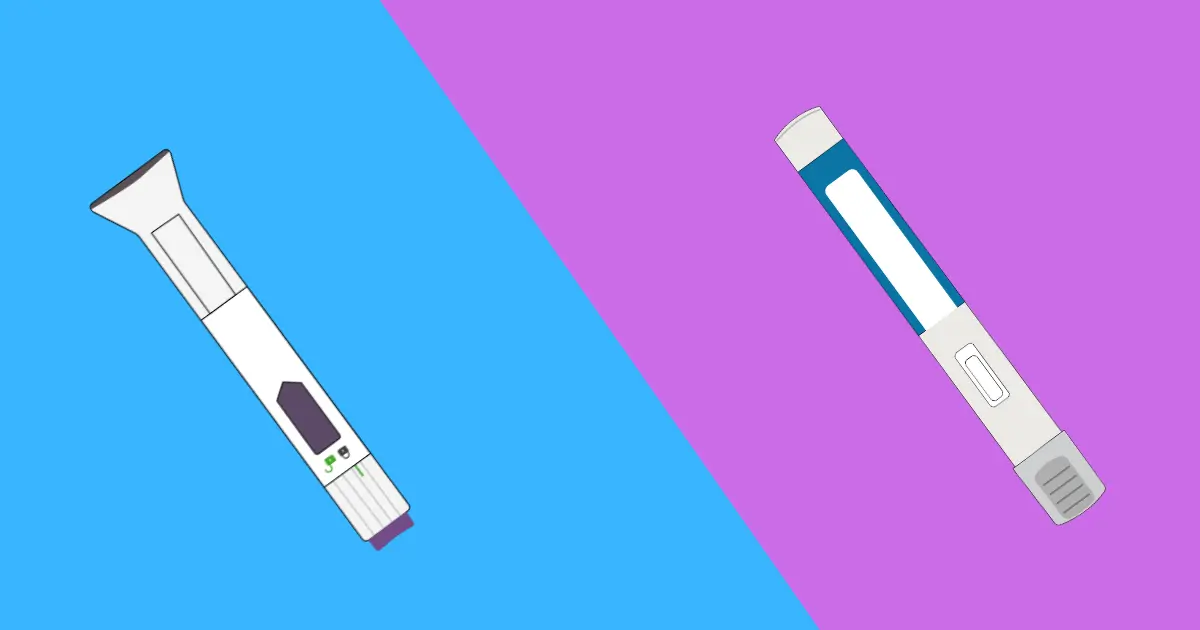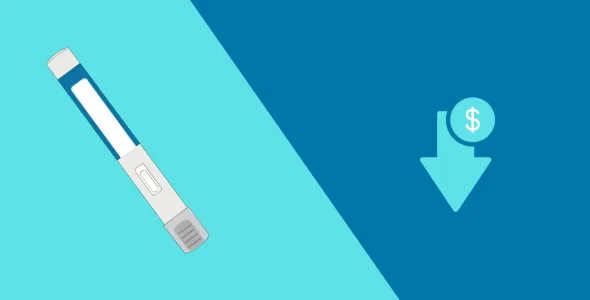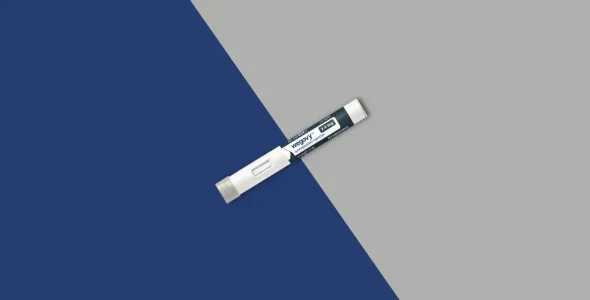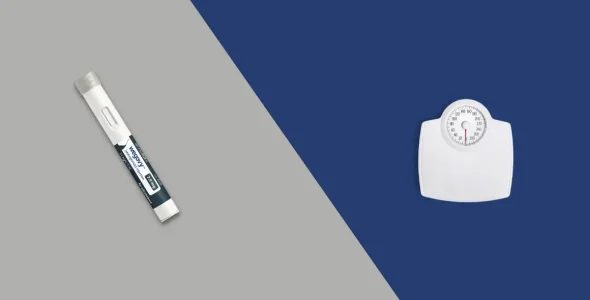Mounjaro vs. Wegovy: Which weight loss drug is better?
Mounjaro and Wegovy are game-changing medications making waves, but which one is better for weight loss? Let's break down the science and which medication is right for you.
Key highlights
- Wegovy (semaglutide) and Mounjaro (tirzepatide) are both injections administered once a week. They work similarly and help with weight loss, but there are a few key differences between them.
- Wegovy is a GLP-1 medication, and Mounjaro is a GLP-1/GIP medication. Mounjaro’s dual-action mechanism offers stronger blood sugar control and weight loss, but some people may be more sensitive to its side effects at higher doses.
- Both medications can cause similar side effects, like nausea, vomiting, and stomach issues, but may differ in frequency and intensity with dosage.
- You can switch from Wegovy to Mounjaro (or vice versa), but they’re not the same and aren’t interchangeable. Your healthcare provider will help you decide which one is best for you.
Did you know that over 40% of Americans have obesity, and over 38 million people have type 2 diabetes? This growing health crisis underscores the urgent need for effective and sustainable solutions for managing blood sugar levels and weight management.
Mounjaro (tirzepatide) and Wegovy (semaglutide) are popular once-weekly injectable medications used to lower blood sugar levels in people with type 2 diabetes and for chronic weight management in people with obesity (body mass index of 30 or more) and overweight (body mass index of 27 or more) with other weight-related conditions, respectively.
Both work by mimicking hormones in the body that regulate blood sugar and appetite, making them effective options for people looking to control their diabetes and lose weight. They are similar medications with some key differences.
Considering Mounjaro or Wegovy for weight loss? This comprehensive guide compares their effectiveness, side effects, costs, and who they’re best for.
Understanding Mounjaro and Wegovy
Mounjaro and Wegovy are once-weekly subcutaneous injectable prescription drugs containing different active ingredients manufactured by Eli Lilly and Novo Nordisk, respectively.
Mounjaro (tirzepatide)
Mounjaro (tirzepatide) is a prescription injectable medication approved by the FDA (U.S. Food and Drug Administration) in 2022 to help lower blood sugar levels in adults with type 2 diabetes. It is also widely prescribed off-label for weight loss in people with obesity or overweight, combined with diet and exercise.
Mounjaro is a dual GIP and GLP-1 receptor agonist manufactured by Eli Lilly. It works by activating two different receptors in the body: glucose-dependent insulinotropic polypeptide (GIP) and glucagon-like peptide-1 (GLP-1). By targeting both receptors, Mounjaro lowers blood sugar and reduces appetite more than GLP-1 receptor agonists do. This dual action means better blood sugar control and weight loss.
As a GLP-1 receptor agonist, it increases insulin release when blood sugar is high and lowers blood sugar. It slows down digestion, reduces glucose spikes after meals, and suppresses appetite, so you feel fuller for longer and eat less. Mounjaro also reduces glucose production in the liver, which helps keep blood sugar levels stable.
It is available in six strengths: 2.5 mg (starting dose), 5 mg, 7.5 mg, 10 mg, 12.5 mg, and 15 mg (maximum dose), with weekly doses.
Wegovy (semaglutide)
Wegovy was approved by the FDA for chronic weight management in adults with obesity and overweight with at least one weight-related condition such as high blood pressure, type 2 diabetes or high cholesterol. It was also approved in 2024 for reducing the risk of serious heart problems in adults with obesity or overweight.
Semaglutide belongs to a class of drugs called glucagon-like peptide-1 (GLP-1) receptor agonists known for their dual benefits: helping to control blood sugar levels in adults with type 2 diabetes and supporting weight loss in people with or without diabetes when used in combination with diet and increased physical activity.
Semaglutide works for weight loss by mimicking the action of incretin, a natural gut hormone, particularly GLP-1, and targeting GLP-1 receptors in the brain that control appetite and slow down how quickly the stomach empties, making you feel fuller for longer. By increasing GLP-1 activity, semaglutide helps to reduce hunger and suppress appetite.
Prescribers typically start patients at 0.25 mg once weekly for 4 weeks and increase the dose until a full dose of 2.4 mg is reached. The maximum maintenance dose of Wegovy is 2.4 mg once weekly.
Effectiveness for weight loss: Which works better?
There haven’t been direct trials comparing Mounjaro and Wegovy, but indirect data suggests that Mounjaro may be more potent for weight loss. It has shown higher average weight loss in studies compared to Wegovy.
In a study that lasted about 18 months, Mounjaro was compared to a fake shot (placebo) with no medicine in it. People with diabetes who took the highest dose of Mounjaro (15 mg) lost about 15.7% of their body weight on average. Also, nearly one out of three people lost 20% or more of their body weight.
In another study that lasted about 16 months, Wegovy was compared to a fake shot (placebo) in people with diabetes. On average, those taking Wegovy lost about 9.6% of their body weight. In a STEP-1 trial, participants with obesity or overweight taking 2.4 mg of semaglutide injection once weekly with lifestyle changes for 17 months lost about 14.9% of their body weight.
If you have type 2 diabetes, you might be able to use Wegovy as part of your weight management plan. The STEP 2 trial showed that people with type 2 diabetes who took Wegovy lost an average of 10% of their starting body weight over 68 weeks and saw improvements in their A1C levels.
Mounjaro vs. Wegovy: Key similarities
Mounjaro and Wegovy are similar medications in the following ways:
- Both medications are subcutaneous injections (injected under the skin) once per week, using pre-filled pens, with similar injection sites (abdomen, thigh, upper arm).
- Both medications are injected once per week.
- They are both GLP-1 receptor agonists, although Mounjaro also activates the GIP receptor.
- Both medications may cause similar gastrointestinal side effects, such as nausea and diarrhea. These symptoms are most commonly experienced during the initial treatment phase and periods of dose escalation, and they often improve as the body adjusts to the medication.
- Both medications help with weight loss by slowing gastric emptying, which helps suppress appetite.
- Both Mounjaro (tirzepatide) and Wegovy (semaglutide) can aid in chronic weight management in adults with obesity (BMI ≥30) or overweight individuals (BMI ≥27) with at least one weight-related condition, such as type 2 diabetes, hypertension, or dyslipidemia.
- While both medications can significantly aid weight loss, they are most effective when combined with a reduced-calorie diet and increased physical activity. Lifestyle modification remains a critical component for long-term success and weight maintenance.
Mounjaro vs. Wegovy: Key differences
Mounjaro and Wegovy contain different active ingredients, tirzepatide and semaglutide, and are sold under different brand names. The main differences are as follows:
FDA approvals
- Mounjaro: A prescription injectable medication approved by the FDA (U.S. Food and Drug Administration) in 2022 to help lower blood sugar levels in adults with type 2 diabetes. It is also prescribed off-label for weight loss in people with obesity or overweight, as an adjunct to diet and exercise.
- Wegovy: The FDA has approved Wegovy for chronic weight management in adults and children aged 12 years and older with:
- Obesity: body mass index (BMI) of 30 or higher, or;
- Overweight: BMI of 27 or higher with at least one weight-related health condition, like type 2 diabetes, high blood pressure, or high cholesterol.
In 2024, the FDA approved Wegovy to help reduce the risk of heart problems in adults with obesity or overweight and existing heart disease.
Mechanism of action
Mounjaro’s mechanism of action
Mounjaro works by activating two gut hormones: glucagon-like peptide-1 GLP-1 and glucose-dependent insulinotropic polypeptide GIP receptor in the brain and the pancreas.
Activating both GLP-1 and GIP receptors increases insulin secretion, decreases glucose production by the liver, reduces hunger and cravings, and promotes satiety, leading to less food intake and weight loss.
This helps regulate insulin after meals, controls blood sugar, slows stomach emptying, and reduces appetite, which leads to eating less and consequently losing weight.
This dual action may make Mounjaro more effective for weight management and blood glucose control than other GLP-1 medications that target only one receptor, like Ozempic and Wegovy, which contain the active ingredient, semaglutide.
Wegovy’s mechanism of action
Wegovy can lead to significant weight loss in people with excess weight and obesity when used with lifestyle changes.
In a 68-week clinical trial, participants on Wegovy lost an average of 14.9% body weight compared to 2.4% in the placebo group.
Semaglutide works by mimicking the GLP-1 receptor, a natural hormone that releases insulin, reduces glucagon and controls appetite, so you eat less. Together, these effects make it easier to lose weight when used with a healthy diet and exercise.
Semaglutide lowers blood sugar by reducing glucagon production, a hormone produced by the pancreas that tells the liver to release stored sugar into the blood, which raises blood sugar levels.
By suppressing glucagon, semaglutide prevents the liver from releasing too much sugar and keeps blood sugar more stable after eating.
This helps with blood sugar control and weight loss by stopping the body from storing excess sugar as fat, creating a better environment for burning fat and losing weight.
Semaglutide helps with weight loss by slowing down how fast food moves through the stomach and into the intestine, also known as gastric emptying. This means you feel full and less hungry for longer, and eat less or snack less between meals.
Semaglutide works by targeting the GLP-1 receptors in the brain to reduce food cravings and increase fullness. By targeting these brain signals, semaglutide controls hunger and satiety.
This makes you less hungry and more full after eating, so you eat less and are less likely to give in to food cravings, which can support weight loss.
Semaglutide lowers calorie intake by making you feel full for longer and reduces your food intake. By acting on the brain to increase satiety and slow down gastric emptying, it controls your appetite, so you eat fewer calories.
Dosage
Mounjaro and Wegovy come as pre-filled subcutaneous weekly injections taken on the same day of the week and can be taken with or without food.
Mounjaro dosage form and strengths
Mounjaro (tirzepatide) comes in a pre-filled pen for subcutaneous injection. It is available in six strengths: 2.5 mg (starting dose), 5 mg, 7.5 mg, 10 mg, 12.5 mg, and 15 mg (maximum dose), with weekly doses. The dosage is typically adjusted based on individual needs and treatment goals.
Wegovy forms and strengths
Wegovy is available in five different pre-filled, single-dose syringes, including 0.25 mg, 0.5 mg, 1.0 mg, 1.7 mg, and 2.4 mg. Each pen contains one dose, so you’ll need four pens for a 30-day supply.
Healthcare professionals usually start patients at 0.25 mg once weekly for 4 weeks, and then the dose is gradually increased every 4 weeks until the maximum dose of 2.4 mg once a week is reached.
Effectiveness for reducing HbA1c levels
In clinical trials, people taking Mounjaro had a bigger drop in A1C (average blood glucose levels over 3 months) than those taking Wegovy. If you need more help lowering your A1C, Mounjaro might be a better option compared to Wegovy.
In a 40-week trial, Mounjaro (5 mg, 10 mg, and 15 mg) resulted in HbA1c reductions of 1.8%, 1.7%, and 1.7%, respectively, compared to 0.1% in the placebo group.
In another trial involving individuals with cardiovascular disease and obesity but without diabetes, semaglutide (2.4 mg) reduced the progression to diabetes by 5.4% compared to placebo over approximately 3 years.
These studies highlight that while both Mounjaro and Wegovy are effective in managing blood glucose levels, Mounjaro demonstrates superior HbA1c reduction compared to Wegovy, particularly in individuals with type 2 diabetes.
Effectiveness for weight loss
A head-to-head trial comparing semaglutide and tirzepatide shows that tirzepatide promotes significantly more weight loss than semaglutide. People taking tirzepatide showed an average weight loss of 20.2% vs. 13.7% with semaglutide.
A study found that over 18 months, people with type 2 diabetes who took 15 mg of tirzepatide (the active ingredient in Mounjaro) lost an average of 18% of their body weight, compared to 12.4% for those taking 2.4 mg of semaglutide (the active ingredient in Wegovy).
Another study showed that people taking 2.4 mg of semaglutide with a low-calorie diet and exercise lost an average of 15% of their body weight over 68 weeks, and those taking 1 mg with diet and exercise lost about 7% of their body weight over 68 weeks.
In another clinical trial, people taking the highest dose of Wegovy combined with lifestyle changes lost an average of 15% of their body weight over 68 weeks.
Side effects and safety: Which is more tolerable?
Deciding whether Wegovy or Mounjaro is right for you is a personal choice that should be made with your doctor. There are several factors to consider, including your medical conditions, goals, insurance coverage, and physician recommendations.
Both Mounjaro and Wegovy commonly cause mild gastrointestinal side effects such as nausea, vomiting, diarrhea, constipation, and abdominal discomfort. These symptoms typically occur during the initial treatment phase or dose increases and often improve over time.
While both medications have similar tolerability profiles, some patients report slightly more nausea with Wegovy at higher doses, whereas Mounjaro’s dual GIP/GLP-1 action may offer slightly improved GI tolerance for some individuals.
Both medications carry an FDA black box warning for the potential risk of thyroid C-cell tumors (medullary thyroid carcinoma), based on animal studies. As a result, they are contraindicated in individuals with a personal or family history of MTC or Multiple Endocrine Neoplasia syndrome type 2 (MEN 2).
Mounjaro requires additional caution when used with other diabetes medications like insulin or sulfonylureas, as it can increase the risk of hypoglycemia.
In contrast, Wegovy has a low risk of causing hypoglycemia when used alone for weight management. Unique considerations include Wegovy’s higher dose-related GI effects and Mounjaro’s primary use in patients with type 2 diabetes.
Common side effects for Mounjaro and Wegovy
Mounjaro and Wegovy work in similar ways and can cause similar side effects, but Mounjaro may cause stronger effects because it works with both GIP and GLP-1, and side effects might be more common for some people.
Side effects are most common when you first start using the medication or increase the dose, and higher doses of both drugs can lead to a higher risk of side effects.
Mounjaro side effects
The most common side effects of Mounjaro include:
- Nausea
- Diarrhea
- Vomiting
- Loss of appetite
- Constipation
- Indigestion
- Stomach pain
Wegovy side effects
Common side effects of Wegovy include:
- Nausea
- Vomiting
- Diarrhea
- Stomach pain
- Headache
- Upset stomach
- Fatigue
- Dizziness
Serious side effects
Although rare, some people taking Mounjaro or Wegovy may experience:
- Severe allergic reaction
- Injection site reactions
- Hypoglycemia (low blood sugar)
- Kidney problems
- Diabetic retinopathy in patients with Type 2 Diabetes
- Pancreatitis (inflammation of the pancreas)
- Gallbladder problems
Warnings for Mounjaro and Wegovy
Both drugs have a black box warning from the FDA for the risk of thyroid tumors or thyroid cancer.
You should not use Mounjaro if you:
- Are allergic to tirzepatide or any of the ingredients.
- Have a personal or family history of medullary thyroid cancer or Multiple Endocrine Neoplasia syndrome type 2 (MEN 2).
- Are pregnant or planning to become pregnant.
- Are breastfeeding, as it is not known if Mounjaro passes into breast milk.
- Have serious kidney or liver problems.
- Have a severe gastrointestinal disease such as gastroparesis (delayed stomach emptying).
You should not use Wegovy if you:
- Are allergic to semaglutide or any of the ingredients.
- Have a personal or family history of medullary thyroid cancer or Multiple Endocrine Neoplasia syndrome type 2 (MEN 2).
- Are pregnant or planning to become pregnant.
- Are breastfeeding, as it is not known if Ozempic passes into breast milk.
- Have a severe gastrointestinal disease, such as gastroparesis (delayed stomach emptying).
- Have diabetic ketoacidosis (a serious complication of diabetes).
Cost and insurance coverage (2025 update)
Without insurance, Wegovy has a list price of $1,349.02 for a 28-day supply, while Mounjaro has an estimated list price of $1,079.77 per month.
The cost of Mounjaro and Wegovy varies based on your dose, insurance coverage, and whether you qualify for the manufacturer’s savings card program.
Insurance coverage varies by plan, and some insurance providers may cover Mounjaro for type 2 diabetes but not for weight loss.
Both Mounjaro and Wegovy have savings programs to help reduce out-of-pocket costs for eligible patients.
Insurance coverage
Insurance coverage for weight loss medications in the U.S. is often complex and inconsistent. Coverage can vary widely depending on the type of insurance (whether it is private, employer-sponsored, Medicare or Medicaid), and often requires prior authorization.
Medicare typically does not cover weight loss drugs like Mounjaro or Wegovy. Some manufacturers offer savings cards or patient assistance programs for eligible U.S. residents, but availability and eligibility vary.
Additionally, insurers may impose step therapy requirements, meaning patients must try and fail one medication (usually a lower-cost option) before coverage is approved for another.
Mounjaro cost and insurance coverage
The list price of Mounjaro is $1,069.08 per fill, according to the manufacturer, Eli Lilly. Without insurance, the retail price is $1,000-$1,200 or more per month. Each fill includes 4 prefilled pens, which is a 28-day supply.
Many insurance plans, including Medicare and Medicaid, will cover Mounjaro if used for type 2 diabetes. However, your copay will vary by plan, and your out-of-pocket costs will be higher until you meet your deductible. Most Medicare Part D plans cover many diabetes medications, including Mounjaro.
The Mounjaro savings card is a copay assistance program offered by Eli Lilly that helps reduce the cost of medication for people with commercial or private insurance. If you qualify, you can use the card to get Mounjaro for as little as $25/month. This program excludes people who are enrolled in government-sponsored insurance such as Medicare or Medicaid.
There is currently no patient assistance program or generic alternative available for Mounjaro.
Wegovy cost and insurance coverage
The list price of Wegovy is $1,349.02 per month, according to the manufacturer, Novo Nordisk, which is about $337.30 per week or $16,188.20 per year.
Check with your insurance provider if they cover Wegovy. Most insurance plans, including Medicare and Medicaid, do not currently cover weight loss drugs.
The Wegovy Savings Card program helps you save money with or without insurance to reduce your out-of-pocket cost of Wegovy to as low as $0/month, making the medication more affordable for eligible individuals.
The program is available to those with commercial insurance or without insurance coverage and excludes those with government-sponsored insurance like Medicare and Medicaid.
To qualify for the Wegovy Savings Card, you must meet certain criteria. If you qualify for the savings card, you can also join WeGoTogether for free. This program offers personalized support to help with weight loss and maintenance, including a health coach, a progress-tracking portal, and more.
Mounjaro savings tips
Here are a few strategies for potentially reducing the cost of brand-name Mounjaro:
Mounjaro Savings Card
The Mounjaro savings card is a program offered by Eli Lilly that helps reduce the cost of the medication.
If you qualify for the Mounjaro Savings Card, you can pay as low as $25 for a 1-month or 3-month prescription. You need to have a private or commercial insurance drug plan that covers Mounjaro and a prescription for an FDA-approved use, such as type 2 diabetes.
You cannot be enrolled in any state, federal, or government-funded healthcare program, such as Medicaid, Medicare, Medicare Part D, Medicare Advantage, Medigap, DoD, VA, TRICARE, or any state prescription drug assistance program. You must also be a resident of the United States or Puerto Rico and be at least 18 years old.
The Mounjaro savings card is a great option to help manage the cost of diabetes treatment. It can reduce the amount you pay for Mounjaro, making the medication more affordable if your insurance doesn’t cover the full cost of the medication. By using the savings card, you can save on your prescription, stay on track with your treatment plan, and manage your diabetes.
Mounjaro coupons and discount cards
You can get Mounjaro coupons or Mounjaro prescription discount cards through prescription drug savings companies like GoodRx and SingleCare, which offer up to 25% off the retail price. These coupons work at pharmacies near you without insurance. Prices vary by quantity, pharmacy, location, and medication form.
90-day refills
Some mail-order pharmacies offer discounts on a 3-month supply of medications. Ordering a 90-day supply at a time can also be more convenient. Eligibility may vary by your insurance plan’s quantity limits.
Wegovy savings tips
Here are a few options for potentially reducing the cost of brand-name Wegovy:
Wegovy Savings Card program
With the Wegovy Saving Card, you could pay as little as $0 per month if your commercial insurance covers Wegovy, with a maximum savings of $225 per month.
If you have commercial insurance that doesn’t cover Wegovy or are paying with cash (excluding government beneficiaries), you’ll pay $499 for a 28-day supply of Wegovy. This offer is available for all 5 different dose strengths of Wegovy.
To qualify for the Wegovy Savings Card, you must meet certain criteria. If you’re eligible for the savings card, you can join WeGoTogether for free. This program offers personalized support to help with weight loss and maintenance, including access to a health coach, a progress-tracking portal, and more.
NovoCare Pharmacy
NovoCare Pharmacy is an option for patients who do not have insurance coverage for Wegovy. You can purchase all dosage strengths of the medication for $499 per month, directly from the manufacturer’s direct-to-consumer pharmacy.
Prescription discount cards
If you don’t qualify for the Wegovy Savings Card or want to compare prices at different pharmacies, several drug discount websites offer coupons for participating pharmacies. These coupons can help you save between $144 and $465, which is about 9% to 26% off the retail price of Wegovy, depending on the pharmacy and the discount site.
Here are some reputable websites that offer Wegovy coupons and discounts for Wegovy. These coupons can be used at participating pharmacies.
- GoodRx: A well-known platform that allows you to compare prescription prices at local pharmacies and provides discounts of up to 80% off the retail price.
- SingleCare: Provides prescription savings cards that can be used at thousands of pharmacies across the U.S. with discounts of up to 80% off the retail price.
- WellRx: Provides a free prescription discount card that offers savings on medications like semaglutide with a discount of up to 80%.
- Optum Perks: A prescription savings card that can be used at many pharmacies across the U.S. with a discount of up to 80%.
Online pharmacies
Buying Wegovy online is safe if you use reputable sources. The FDA recommends purchasing prescription medications with a prescription from licensed pharmacies. Use the National Association of Boards of Pharmacy’s search tool to see if an online pharmacy is legit.
Mail-order pharmacies
Mail-order pharmacies can offer lower prices because they have lower overhead since they don’t need physical stores. They often offer 90-day supplies, which can be cheaper per dose. Additionally, mail-order pharmacies may have special pricing agreements with insurance plans or work directly with drug manufacturers, cutting out extra costs. If you’re considering using one, check with your insurance provider to see if it’s covered and compare prices with your local pharmacy.
90-day supply
Sometimes, getting a 90-day supply of Wegovy can be cheaper than getting three 30-day supplies. Ask your pharmacist to compare the prices. If the 90-day option saves you money and you can afford it, it might be a better choice.
Who should take Mounjaro or Wegovy?
Mounjaro and Wegovy are intended for different, though sometimes overlapping, patient groups based on their FDA-approved uses. Mounjaro is approved for managing type 2 diabetes, while Wegovy is approved for chronic weight management in adults with obesity or overweight conditions with weight-related health issues. Mounjaro is commonly used off-label for chronic weight management.
Insurance coverage often depends on these specific approvals; coverage for Mounjaro may be more accessible for those with diabetes, while Wegovy may be covered for those meeting certain BMI and health criteria.
It’s important to consult with a healthcare provider to determine which medication is appropriate based on medical history, goals, and insurance requirements. Providers can also help navigate the often-complicated insurance process, including prior authorizations or appealing coverage denials.
Who should take Mounjaro?
Mounjaro (tirzepatide) is FDA-approved specifically for the treatment of type 2 diabetes in adults. To be eligible, patients must have a diagnosis of type 2 diabetes and may use Mounjaro as an adjunct to diet and exercise to improve blood sugar control. It is not FDA-approved for type 1 diabetes or weight loss.
Currently, using Mounjaro solely for weight loss is considered off-label in the U.S. However, a separate formulation of tirzepatide, Zepbound, is FDA-approved for chronic weight management in adults with a BMI ≥30 (obesity) or a BMI ≥27 (overweight) with at least one weight-related condition such as hypertension, type 2 diabetes, or high cholesterol.
You may consider Mounjaro if:
- You have type 2 diabetes and need better glucose control
- You are looking for significant weight loss, as Mounjaro has shown up to 20% weight reduction in clinical trials, more than most other diabetes or weight loss drugs.
Who should take Wegovy?
Wegovy is FDA-approved for chronic weight management in adults who meet one of the following criteria:
- BMI ≥30 (classified as obesity), or
- BMI ≥27 (overweight) with at least one weight-related condition such as type 2 diabetes, high blood pressure, or high cholesterol
You may consider Wegovy if:
- You have insurance coverage that includes obesity medications
- You need weight loss support without having type 2 diabetes. Wegovy is specifically approved for weight management, not glucose control.
- You have existing cardiovascular disease. Wegovy has shown added cardiovascular benefits in patients with heart disease and obesity, reducing the risk of major cardiac events.
Frequently asked questions
Can I switch from Wegovy to Mounjaro?
Yes, you can switch from Wegovy to Mounjaro with your doctor’s guidance. Your doctor will help you make the switch safely and may adjust your dosage to minimize side effects.
Which is cheaper, Mounjaro or Wegovy?
Mounjaro is slightly less expensive than Wegovy. The list price for Mounjaro is around $1,070 per month, while Wegovy’s list price is approximately $1,349 per month. However, actual out-of-pocket costs can vary based on insurance coverage and eligibility for savings programs. Both medications offer manufacturer savings cards that may reduce costs for eligible patients.
Does Mounjaro work faster than Wegovy?
Yes, Mounjaro may work faster than Wegovy for weight loss. Some studies show that people using Mounjaro lose more weight in a shorter amount of time compared to those using Wegovy.
Can you take both drugs together?
No, you should not take Mounjaro and Wegovy at the same time. Using both together hasn’t been studied and could increase the risk of side effects.
How to maximize the benefits of lifestyle modifications
To get the best results from Mounjaro or Wegovy, it’s important to combine them with healthy lifestyle changes. These medications work best when used in conjunction with a lower-calorie diet and regular physical activity.
Making long-term, realistic changes to your eating and exercise habits is key to keeping the weight off and improving your overall health. Quick fixes don’t last, but small, consistent steps like choosing healthier foods and staying active can lead to lasting success in your weight loss journey.
Conclusion
Wegovy is approved to help adults and adolescents 12 years of age and older lose weight, while Mounjaro is FDA-approved to treat type 2 diabetes in adults.
Mounjaro (or Zepbound) may lead to more weight loss on average, but Wegovy has proven heart health benefits and is more likely to be covered by insurance for weight loss.
There are several ways to save money on Wegovy and Mounjaro. If you qualify, the drug companies offer savings cards that can lower the cost of your prescription.
It’s hard to say which medication is better for you overall because the right medication depends on your medical history, needs, goals, insurance coverage, and potential side effects. What works best for you may not work best for someone else.
If you’re not sure whether Wegovy or Mounjaro is right for you, talk to your doctor. They can help you decide which one is the better choice for you.










